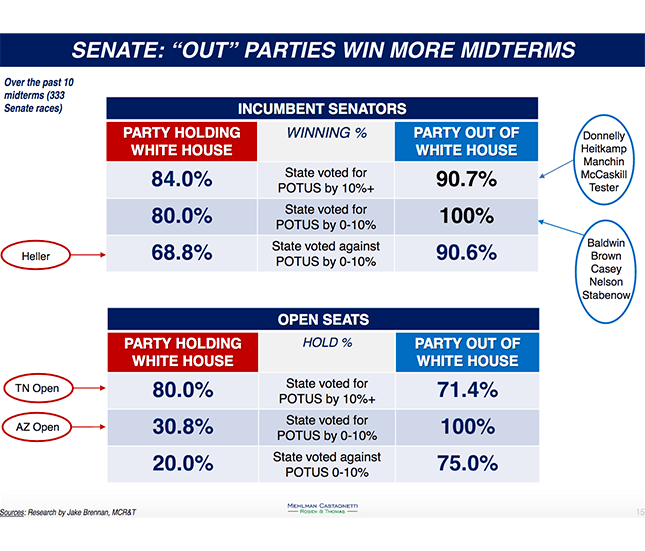History argues for Democratic Senate gains
Senate Democrats have one enormous advantage even as they face one of the most difficult political terrains in recent memory: They are not the party that controls the White House.
A new analysis of election results over the past 10 midterm cycles underlines that since 1978, incumbents of the party out of power, even in states the president carried in the previous election, are overwhelmingly likely to win another six-year term.
This is true, the analysis states, even in states where the president cruised to reelection.
{mosads}In states that went for the president by more than 10 percentage points, the other party’s senator has won reelection in the following midterm more than 90 percent of the time.
Over that period, 43 senators have run for reelection in states the other party’s president won by more than 10 percentage points. Only four — Max Cleland (D-Ga.) in 2002, Al D’Amato (R-N.Y.) in 1998, Howard Cannon (D-Nev.) in 1982 and Edward Brooke (R-Mass.) in 1978 — lost their reelection bids.
Such statistics are of crucial interest given this year’s Senate map, in which 10 Democratic incumbents will run for reelection in states President Trump won in 2016.
“Every midterm, it’s always good to be the party out of the White House,” said Bruce Mehlman, a Republican lobbyist who analyzed the 333 Senate races that have taken place since 1978 as part of a widely-read quarterly political update to clients.
Five Democratic senators are running for reelection in states Trump won by more than 10 points: Sens. Joe Donnelly (Ind.), Claire McCaskill (Mo.) and Heidi Heitkamp (N.D.) are among the most vulnerable members seeking reelection. Sens. Joe Manchin (W.Va.) and Jon Tester (Mont.) are seen as safer bets, though their wins are by no means assured.
Five other Democrats are running for reelection in states Trump won by fewer than 10 points: Sens. Tammy Baldwin (D-Wis.), Sherrod Brown (Ohio), Bob Casey Jr. (Pa.), Bill Nelson (Fla.) and Debbie Stabenow (Mich.). Of those five, only Nelson has a top-tier challenger, in Florida Gov. Rick Scott (R).

If history holds, all five of those senators will be back for another six-year term. In the last 10 midterms, no senator seeking reelection from a state the other party’s president won by fewer than 10 percentage points has lost.
Incumbents from the party out of power have a better chance of winning reelection than incumbents from the same party that holds the White House, Mehlman found.
Just about half of members of a president’s party win reelection in states the president did not carry. Over the last 40 years, the incumbent of a president’s party has won reelection in 14 of 27 attempts in a state the president did not carry.
This year, only one Republican — Sen. Dean Heller (R-Nev.) — falls into that category. But Trump lost Nevada to Hillary Clinton by just 2.5 percentage points, and the incumbent senator has won nearly 69 percent of the time if their party’s president lost by such a narrow margin.
The president’s party has held 80 percent of open seats in states he carried by more than 10 points over the last 10 midterms, but just 31 percent of seats that the president carried by less than a 10-point margin. This year, that means Republicans have a strong chance to retain Sen. Bob Corker’s (R-Tenn.) seat, but they have a far weaker chance of holding on to Sen. Jeff Flake’s (R-Ariz.) seat in a state Trump carried by only 4 percentage points.
“It’s better to be a Democratic incumbent in a state Trump won by more than 10 than a Republican open seat candidate in a state Trump won by less than 10,” Mehlman said.
Copyright 2023 Nexstar Media Inc. All rights reserved. This material may not be published, broadcast, rewritten, or redistributed. Regular the hill posts








